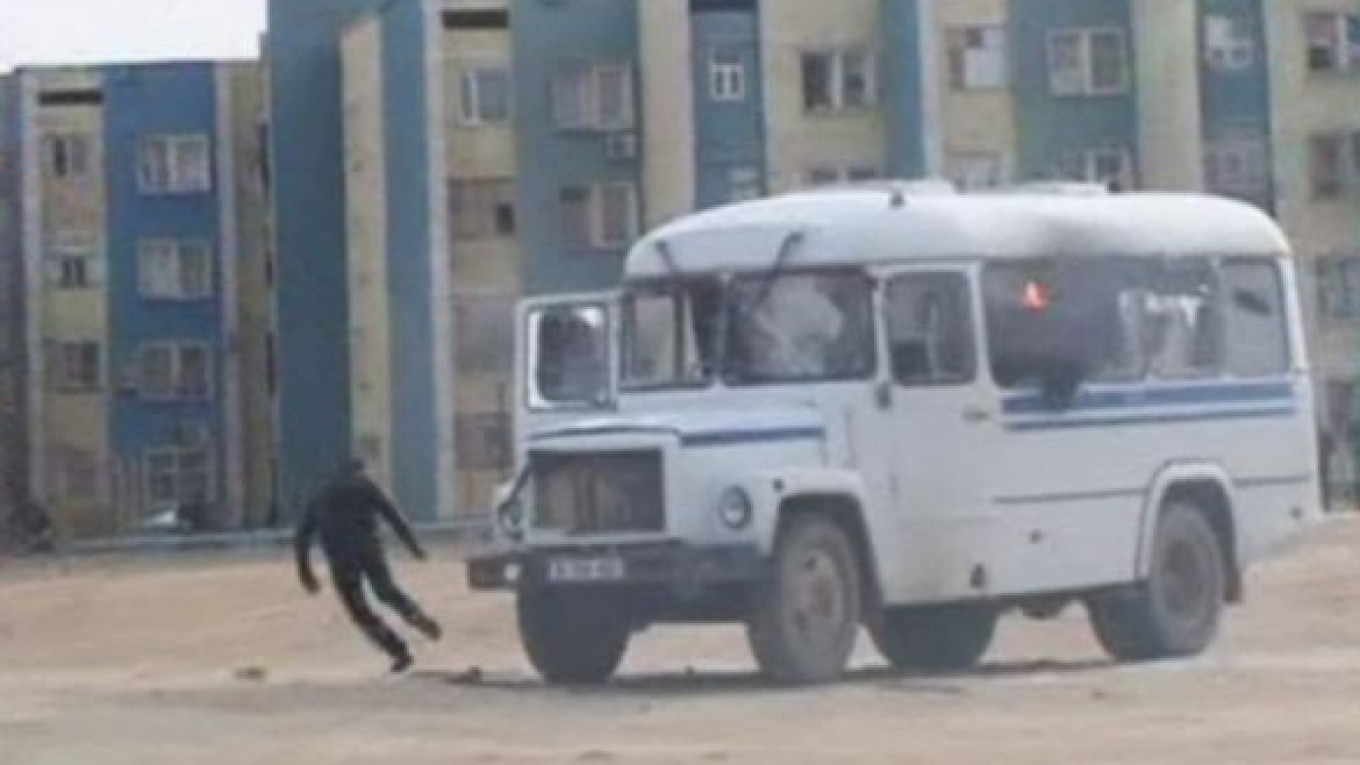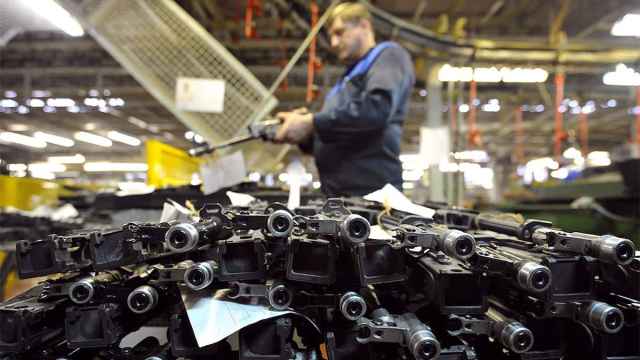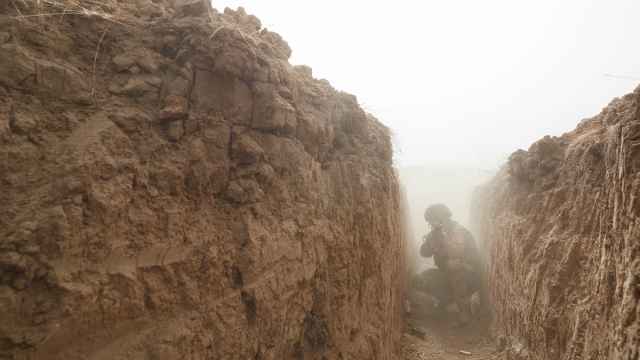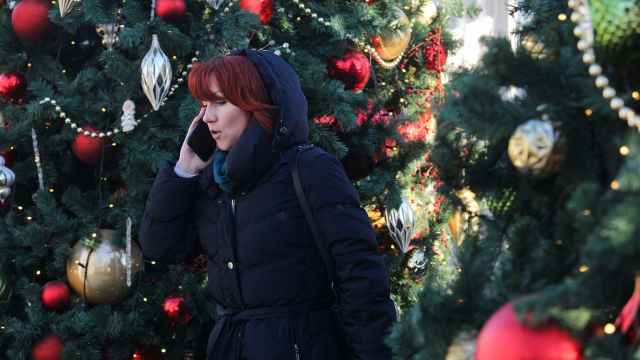AKTAU, Kazakhstan — Hundreds of oil workers held a third day of protests in the capital of Kazakhstan's western oil-producing region on Monday, after at least 15 people were killed in the country's deadliest riots in decades.
About 400 protesters confronted lines of police, some of whom were armed with automatic rifles, in the main square of Aktau, the capital of the Mangistau region where the clashes broke out.
"We are not looters!" read one of the protesters' banners in response to an accusation by the authorities.
Kazakh President Nursultan Nazarbayev has declared a three-week state of emergency in Zhanaozen, and Interior Minister Kalmukhambet Kasymov has taken residence in the remote town to oversee security operations.
Kasymov said that while the demonstrators have conducted themselves with restraint over the past seven months, the situation quickly deteriorated Friday morning, when participants in a children’s concert in the main square came under attack.
After overpowering the outnumbered police officers, a mob went on a rampage throughout the city, setting alight the mayor’s office, a hotel, the UzenMunaiGas oil company headquarters and the local branch of the governing Nur Otan party, Kasymov said.
Officials said 14 people were killed in clashes with police.
Kasymov said police fired their weapons only because they were left with no other option.
“Nobody specifically gave the order to open fire in that situation. Every police officer took the decision themselves. When they take a weapon off you, there is no need for an order to be issued,” Kasymov said Sunday.
He also insisted that the police did not shoot to kill, but fired in the air or at the ground, and that some people may have been fatally struck by ricocheting bullets. Kasymov conceded, however, that the police force would have to put in place better contingency planning for the deployment of nonlethal crowd control techniques.
The Organization for Security and Cooperation in Europe's chairman-in-office, Lithuanian Foreign Minister Audronius Azubalis, expressed his concern in a statement at the measures adopted in suppressing the disorder.
“Any action to control crowds by law enforcement should be proportionate and in line with international human rights standards,” he said.
Rights activists will likely also be concerned by what appeared to be heavy-handed treatment of detainees at Zhanaozen’s main police station Sunday evening. Journalists at the station reported hearing screams coming from what appeared to be interrogation rooms, while a number of men with bloodied faces were lined up in a row in the corridors with their faces against the wall.
Reporters visiting the town under close supervision were not freely permitted to speak with detainees or residents.
Zhanna Oishibayeva, adviser to the Mangistau governor, said the protesting oil workers met senior Aktau officials on Monday, demanding an increase in their wages.
"They also asked city authorities why civilians had been shot in Zhanaozen," she said. "The rally is being held peacefully, there are no clashes."
In a related development, prosecutors said about 300 demonstrators supporting the Zhanaozen victims blocked railroad traffic in the nearby village of Shetpe for several hours Saturday evening and after police tried to force them away, a group of about 50 set a locomotive on fire, then moved into the town where they broke windows and set the municipal holiday tree ablaze. One person was shot dead as police attempted to quell the unrest.
The latest outbreaks of violence and rallies are unprecedented in modern Kazakhstan, where Nazarbayev enjoys sweeping powers and brooks no dissent.
The suppression of the riots has featured a lot on social networking sites in Kazakhstan. Protesters have picketed Kazakhstan's embassies in Moscow and London, and a rare opposition protest has been held in Kazakhstan's commercial capital and biggest city, Almaty.
About 12 demonstrators were detained by police on Monday as they tried to deliver an open letter in support of Zhanaozen workers to Nazarbayev's palace in the capital, Astana.
"Don't shoot people" and "Blood is cheaper than oil," read their posters.
Kazakhstan, whose economy has bounced back from the global economic crisis on the back of robust energy earnings, appears to be deeply concerned over any damage events over the past few days may have inflicted on the country’s reputation.
Public relations company BGR Gabara distributed a statement on behalf of the Kazakh Embassy in the United States mounting a detailed defense of the authorities actions.
Nazarbayev also has promised to hold a transparent investigation into the Zhanaozen bloodshed.
But as Nazarbayev arrived in Moscow on a two-day visit Monday, Foreign Minister Yerzhan Kazykhanov maintained the official line, saying "bandits" had sparked the riots.
"An oilmen's work dispute should by no means be confused with illegal acts by criminal elements trying to use it in their criminal interests," Kazykhanov told reporters on the sidelines of the visit.
(Reuters, AP)
A Message from The Moscow Times:
Dear readers,
We are facing unprecedented challenges. Russia's Prosecutor General's Office has designated The Moscow Times as an "undesirable" organization, criminalizing our work and putting our staff at risk of prosecution. This follows our earlier unjust labeling as a "foreign agent."
These actions are direct attempts to silence independent journalism in Russia. The authorities claim our work "discredits the decisions of the Russian leadership." We see things differently: we strive to provide accurate, unbiased reporting on Russia.
We, the journalists of The Moscow Times, refuse to be silenced. But to continue our work, we need your help.
Your support, no matter how small, makes a world of difference. If you can, please support us monthly starting from just $2. It's quick to set up, and every contribution makes a significant impact.
By supporting The Moscow Times, you're defending open, independent journalism in the face of repression. Thank you for standing with us.
Remind me later.






